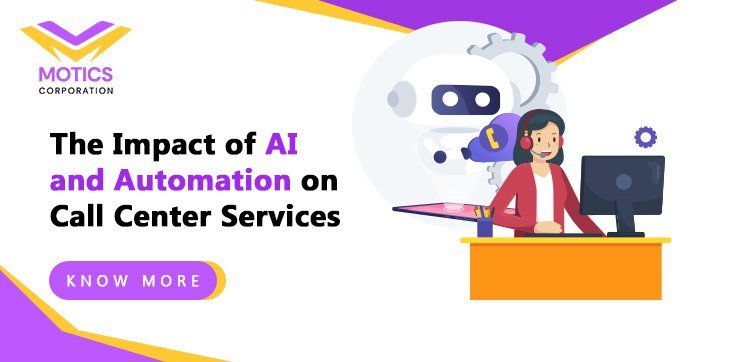The Impact of AI and Automation on Call Center Services

In the ever-evolving landscape of customer service, the integration of Artificial Intelligence (AI) and automation has transformed call center operations. These technologies are redefining how businesses interact with customers, offering enhanced efficiency, personalization, and cost savings. But what does this mean for the future of call centers? Let’s explore the impact of AI and automation on this vital industry.
1. Enhancing Customer Experience
AI-powered solutions such as chatbots and virtual assistants have revolutionized the way call centers handle customer queries. These tools provide instant responses, 24/7 availability, and consistent service quality, ensuring that customers receive timely support. By automating routine queries like account balances or FAQs, businesses can free up human agents to focus on complex and emotionally charged issues, leading to higher customer satisfaction.
2. Boosting Efficiency and Productivity
Automation streamlines workflows by reducing the need for manual tasks. For instance, AI-driven tools can automatically route calls to the most suitable agents based on their expertise and availability. Predictive analytics, another AI application, allows call centers to anticipate customer needs, enabling agents to provide proactive solutions. This not only improves resolution times but also boosts overall productivity.
3. Personalization at Scale
AI leverages customer data to offer personalized interactions. By analyzing past interactions, purchase history, and preferences, AI algorithms can provide tailored recommendations or solutions. This level of personalization fosters stronger customer relationships and enhances brand loyalty.
4. Cost Efficiency
Implementing AI and automation can significantly reduce operational costs. Tasks that once required large teams of agents can now be managed by AI systems, reducing staffing needs and training expenses. Moreover, automated systems minimize human errors, leading to fewer follow-ups and improved first-call resolution rates.
5. Supporting Human Agents
Rather than replacing human agents, AI serves as a powerful assistant. Tools like AI-driven speech analytics and real-time transcription provide agents with actionable insights during calls. AI can suggest solutions, flag potential issues, and even guide agents on maintaining tone and empathy, improving the quality of interactions.
6. Overcoming Language Barriers
AI-powered language processing tools enable call centers to communicate with customers in multiple languages. Automated translation systems and multilingual chatbots make global customer support seamless, catering to diverse audiences without the need for large language-specific teams.
7. Challenges to Address
While AI and automation offer numerous benefits, they also present challenges. Over-reliance on automation can lead to a lack of human touch, which is crucial in certain customer interactions. Additionally, implementing AI solutions requires significant investment and robust data security measures to protect sensitive customer information.
8. The Future of Call Centers
As AI continues to evolve, the future of call centers lies in a harmonious blend of human expertise and automation. Advanced AI models will become even better at understanding context and emotions, ensuring empathetic and effective customer service. Meanwhile, human agents will remain essential for handling nuanced and sensitive cases.
Conclusion
AI and automation are reshaping call center services, driving efficiency, personalization, and cost savings. However, the human element remains indispensable for delivering empathy and building trust. By adopting a balanced approach, businesses can leverage the best of both worlds to create exceptional customer experiences and stay ahead in a competitive market.


